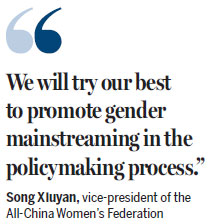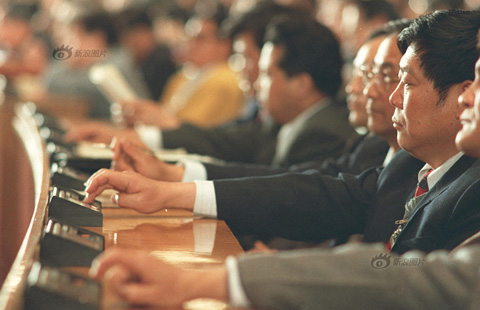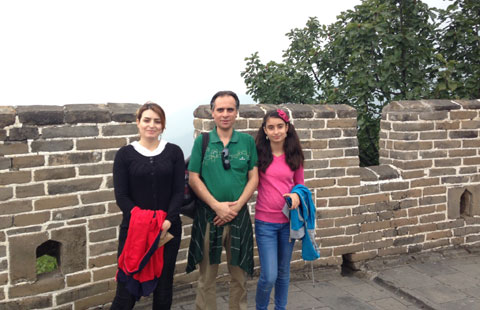Pay gap still wide between men and women despite improvements
Updated: 2015-03-13 13:00
By Yang Yao(China Daily USA)
|
||||||||
"Women hold up half the sky" is a proclamation made by Mao Zedong in 1968. It is widely held, in the East and the West, that raising women's social status was one of Mao's legacies left for China.
After almost half a century, gender gap in earning is still shocking despite the improvement of women's status in general.
According to three national surveys by the National Statistics Bureau, economic inequality between men and women has grown in the last two decades.
Surveys show that in 1990, the annual income of female urban dwellers was about 77.5 percent of that of their male counterparts. The ratio declined to 70 percent in 1999 and 67.3 percent in 2010.
The situation in rural areas is worse. The ratio was about 79 percent in 1999, but in 2010, it dropped to 56 percent.
"More efforts are needed to give women more opportunities and resources, to improve their abilities in administering national and social affairs, and to help them play a more important role in cultural development," Song Xiuyan, vice-president of the All-China Women's Federation, said at the opening ceremony of the 11th National Women's Congress in 2013.
The congress, which is held once every five years, was expected to draw up a blueprint for the economic advancement of Chinese women in the next five years.
"We will try our best to promote gender mainstreaming in the policymaking process," she said.
Gender equality
Though promoting gender equality was written into the Party's administrative program at the 18th CPC National Congress in 2012, the ever-widening income gap remains a problem.
Male-female income difference exists not only in China.
According to the United States Census Bureau, in 2010 the median income of FTYR (full-time, year-round) workers was $42,800 for men, compared to $34,700 for women. The female-to-male earnings ratio was 0.81, slightly higher than the 2008 ratio.
In a women's conference in Silicon Valley, Former US Secretary of State Hillary Clinton lamented the pay gap between men and women in February and said that she may make gender inequality a main theme in her likely 2016 presidential bid.
Yang Jingfei, an accountant in Shanghai, is a 28-year-old woman who has worked for six years. She got pregnant last November.
"My health situation, that I face great risks of miscarriage, does not allow me to burn the night oils at work like before, and I physically can't go on business trips. All these make it harder for me to get better professional opportunities - I get less bonus, lost a promotion chance," she said.
"My husband whom I met at college was not a better student as I was, but he has advanced so much in his career. I feel this is a general path for women, family becomes the first for us when we get to a certain age."
Zhou Haibin, an official with the International Labor Organization, said in an interview that there are many reasons resulting in gender inequality, one of them is discrimination.
"The idea that men are the breadwinners and women are in charge of domestic affairs is more or less entrenched in people's minds, leading to inequality in employment, promotion and income," said Zhou. "The fact that women take greater responsibility in bearing, giving birth to and raising kids than men gives employers the preference to hire men or to give men higher wages and more promotion opportunities. In this sense, women need strong support networks to tough things out," he said.
Leaning forward
In the private sectors and society, there have already been many programs helping women go through the process.
Inspired by Facebook Chief Operating Officer Sheryl Sandberg's book, Lean In: Women, Work and the Will to Lead, a group of female professionals in Beijing are organizing regular seminars and networking events to help other women in the workforce learn new skills and encourage self-growth.
One of the organizers Charlotte Han, 27, said that the meetings are an effective way to acquire social resources as participants are all open, sharing and helpful.
"It helps me to see things out of the box. It is a support network outside of the workplace and family," she said. "I also have access to a career mentor."
For women who start their own businesses, they also face great challenges.
China's female entrepreneurs need to create networks to discover new opportunities and markets, and improve their capabilities, said Liu Ting, president of the Chinese Women's Chamber of Commerce.
yangyao@chinadaily.com.cn

(China Daily USA 03/13/2015 page10)
- World carbon emissions stall after almost 40 years of gains
- Myanmar ferry capsizes; 33 dead, at least a dozen missing
- Chinese air force reinforces patrolling over Myanmar border
- Sino-Thai accord reached on rail project engineering
- Iraqi forces battle Islamic State for Tikrit on two fronts
- Venezuelans march in solidarity with govt

 Bruce Lee's legacy promotes Kungfu in LatAm
Bruce Lee's legacy promotes Kungfu in LatAm
 Germany's Black Forest: a popular holiday destination
Germany's Black Forest: a popular holiday destination
 Sea of color at Shenzhen race
Sea of color at Shenzhen race
 Taking the fight to the terrorists
Taking the fight to the terrorists
 Historical images of 'two sessions'
Historical images of 'two sessions'
 How expats celebrated Chinese Spring Festival in 2015
How expats celebrated Chinese Spring Festival in 2015
 Sacred craft dwindles
Sacred craft dwindles
 Apple Watch clones clock big hit in market
Apple Watch clones clock big hit in market
Most Viewed
Editor's Picks

|

|

|

|

|

|
Today's Top News
Li: Mutual respect, interests key to China-US relations
Foreign investment restrictions
to be cut
Taking the fight to the terrorists
China: Action to be taken if deadly bombing happens again
New bureau set to boost graft fight
28 high-ranking 'tigers' to stand open trial
China lodges representations after Myanmar bomb kills 4
Free trade zones in China
US Weekly

|

|







